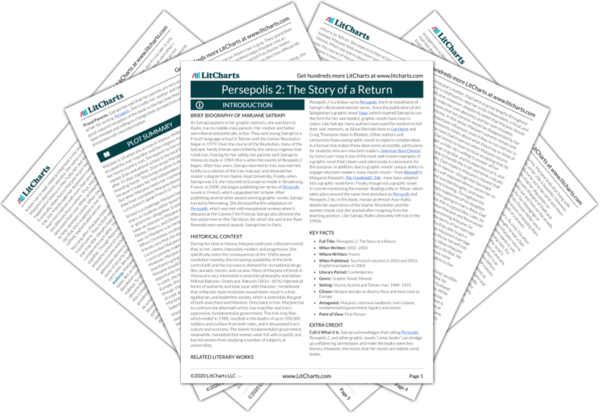Marjane’s Father/Dad Quotes in Persepolis 2: The Story of a Return
The harder I tried to assimilate, the more I had the feeling that I was distancing myself from my culture, betraying my parents and my origins, that I was playing a game by somebody else’s rules. Each telephone call from my parents reminded me of my cowardice and my betrayal. I was at once happy to hear their voices and ashamed to talk to them.
[...]
If only they knew...if they knew that their daughter was made up like a punk, that she smoked joints to make a good impression, that she had seen men in their underwear while they were being bombed every day, they wouldn’t call me their dream child.
“It’s amazing how you’ve grown.”
I didn’t repeat that she, too, had changed. At her age, you don’t grow up, you grow old.
In the letter, he was overjoyed by the thought that I had a peaceful life in Vienna. I had the impression that he didn’t realize what I was enduring.
Despite the doctor’s orders, I bought myself several cartons of cigarettes.
[...]
I think that I preferred to put myself in serious danger rather than confront my shame. My shame at not having become someone, the shame of not having made my parents proud after all the sacrifices they had made for me. The shame of having become a mediocre nihilist.
There were people everywhere. Each passenger was being met by a dozen people. Suddenly, amongst the crowd, I spotted my parents...
...But it wasn’t reciprocal. Of course it made sense. One changes more between the ages of fourteen and eighteen than between thirty and forty.
“Ah, there’s nothing like Iranian tea!”
“Oh yes, especially with a cigarette. Do you want one?”
“Mom!!”
“What? You know the proverb: ‘prosperity consists of two things: tea after a meal, and a cigarette after tea.’”
It was the first time that my mother had spoken to me in this tone: in her eyes now, I had become an adult.
Next to my father’s distressing report, my Viennese misadventures seemed like little anecdotes of no importance. So I decided that I would never tell them anything about my Austrian life. They had suffered enough as it was.
Certainly, they’d had to endure the war, but they had each other and close by. They had never known the confusion of being a third-worlder, they had always had a home! At the same time, how could they have pitied me? I was so shut off. I kept repeating to myself that I mustn’t crack up.
When the apartment door closed, I had a bizarre feeling. I was already sorry! I had suddenly become “a married woman.” I had conformed to society, while I had always wanted to remain in the margins. In my mind, “a married woman” wasn’t like me. It required too many compromises. I couldn’t accept it, but it was too late.

Marjane’s Father/Dad Quotes in Persepolis 2: The Story of a Return
The harder I tried to assimilate, the more I had the feeling that I was distancing myself from my culture, betraying my parents and my origins, that I was playing a game by somebody else’s rules. Each telephone call from my parents reminded me of my cowardice and my betrayal. I was at once happy to hear their voices and ashamed to talk to them.
[...]
If only they knew...if they knew that their daughter was made up like a punk, that she smoked joints to make a good impression, that she had seen men in their underwear while they were being bombed every day, they wouldn’t call me their dream child.
“It’s amazing how you’ve grown.”
I didn’t repeat that she, too, had changed. At her age, you don’t grow up, you grow old.
In the letter, he was overjoyed by the thought that I had a peaceful life in Vienna. I had the impression that he didn’t realize what I was enduring.
Despite the doctor’s orders, I bought myself several cartons of cigarettes.
[...]
I think that I preferred to put myself in serious danger rather than confront my shame. My shame at not having become someone, the shame of not having made my parents proud after all the sacrifices they had made for me. The shame of having become a mediocre nihilist.
There were people everywhere. Each passenger was being met by a dozen people. Suddenly, amongst the crowd, I spotted my parents...
...But it wasn’t reciprocal. Of course it made sense. One changes more between the ages of fourteen and eighteen than between thirty and forty.
“Ah, there’s nothing like Iranian tea!”
“Oh yes, especially with a cigarette. Do you want one?”
“Mom!!”
“What? You know the proverb: ‘prosperity consists of two things: tea after a meal, and a cigarette after tea.’”
It was the first time that my mother had spoken to me in this tone: in her eyes now, I had become an adult.
Next to my father’s distressing report, my Viennese misadventures seemed like little anecdotes of no importance. So I decided that I would never tell them anything about my Austrian life. They had suffered enough as it was.
Certainly, they’d had to endure the war, but they had each other and close by. They had never known the confusion of being a third-worlder, they had always had a home! At the same time, how could they have pitied me? I was so shut off. I kept repeating to myself that I mustn’t crack up.
When the apartment door closed, I had a bizarre feeling. I was already sorry! I had suddenly become “a married woman.” I had conformed to society, while I had always wanted to remain in the margins. In my mind, “a married woman” wasn’t like me. It required too many compromises. I couldn’t accept it, but it was too late.











